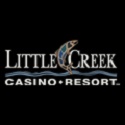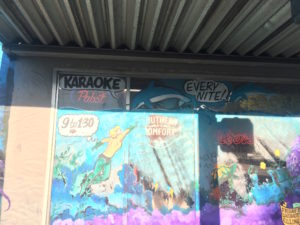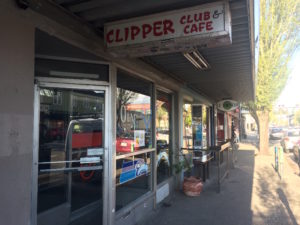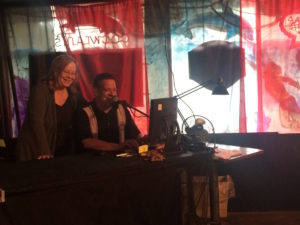If you have gone for a drink at The Clipper in downtown Olympia sometime in the last decade, you have probably run into Tina and Steve Y. If you have managed to catch them early in the evening, you may have heard them ably belt out a cover of a pop song or two. And if you are feeling fortified by whatever beverage you have just consumed, you may decide to take the stage after them. This is karaoke at The Clipper: a nightly ritual that runs almost entirely due to the efforts of resident MC power couple, Steve and Tina.
 A decade ago, there were several bars in downtown Olympia that hosted competing karaoke nights. It was inside this crowded, amateur-singing ecosystem that Steve got his start occasionally filling in as host for a Clipper bartender. When the bar decided to hold karaoke every night of the week, they offered the full time MC job to Steve, who promptly quit his day job. After Tina met Steve, she began to cover parts of his shifts and then host alongside him. Now Tina works weekend nights and leaves the weekdays to Steve, a division of labor that the two owe to Tina’s enduring patience and her “magical mom” ability to quell unruly crowds with a single look.
A decade ago, there were several bars in downtown Olympia that hosted competing karaoke nights. It was inside this crowded, amateur-singing ecosystem that Steve got his start occasionally filling in as host for a Clipper bartender. When the bar decided to hold karaoke every night of the week, they offered the full time MC job to Steve, who promptly quit his day job. After Tina met Steve, she began to cover parts of his shifts and then host alongside him. Now Tina works weekend nights and leaves the weekdays to Steve, a division of labor that the two owe to Tina’s enduring patience and her “magical mom” ability to quell unruly crowds with a single look.

While breaking up fights is occasionally part of their job description, Steve and Tina work hard to create a joyful and mutually supportive atmosphere at The Clipper. To that end, there are a few simple points of karaoke etiquette that singers ought to keep in mind. First off: “There’s no booing allowed,” says Tina. She and Steve emphasize that Clipper karaoke exists for exactly one purpose: fun. Accordingly, the MCs insist that there will never be a reality-TV style singing competition at the bar, an event that would run counter to the communal spirit of Clipper karaoke.
That also means that if you cannot actually sing very well, do not fret—confidence and charm can rescue even the most tone-deaf of performances. Lacking those qualities, you might take Steve’s suggestion to pick a song that everyone knows and will invariably join you in singing, like ABBA’s “Dancing Queen.” That being said, the hosts are not out to pretend that all singers are of equal or even respectable talent. “You can’t compliment everybody, or else people will know you’re being insincere,” Steve points out. An important part of his job is to balance the need to support those who have a hard time getting in front of a crowd with his natural inclination to be snarky in the face of a shaky Billy Idol cover.
If you possess some combination of charisma, skill and luck, you may be bestowed with Clipper karaoke’s highest honor: a stream of bubbles launched into the crowd by a tabletop fan. A regular customer suggested this reward to Steve and Tina years ago, and it has since blown up, so to speak. The politics of getting bubbles can get dicey—Steve and Tina have been accused of showing favoritism or blatantly ignoring obvious talents. In a single evening, you are only eligible for bubbles once, maintains Tina, “no matter how good you are.” There is also a deliberate scarcity in bubble supply—Tina and Steve figure that doling them out too generously would devalue each bubble’s impact. The surest way to receive bubbles is to get the crowd on your side, or as Tina poses the question, “How many butts did you get on the dance floor?”

Another important piece of karaoke etiquette: be patient. Waits are an unavoidable annoyance, especially on a crowded night. On average Tina and Steve estimate that they can fit about twelve songs in an hour. That means that on a busy weekend night waits can last up to four hours. “We try to be as fair as we possibly can,” offers Tina. In the mean time, buy another drink and enjoy the show.
One misconception about karaoke that Steve and Tina are eager to dispel is the notion that the hosts can locate and play whatever rare cut a customer wants. “If it’s your buddy’s metal band, we aren’t going to have it,” Steve explains. Using funds from The Clipper’s karaoke budget, songs are bought for anywhere between $2 to $5 from websites that have purchased the recording rights of popular songs and recorded instrumental versions of them. Those fees, combined with pay-outs to union-wage studio musicians and producers, ultimately add up to a fair amount of money.
On the upside The Clipper’s karaoke library has grown exponentially with the advent of MP3s. What was once a collection of 500 songs burned onto several CDs has transformed into a digital library that boasts over 250,000 tracks from thousands of artists. To be sure, the breadth of The Clipper’s catalogue does not deter the average karaoke-goer from reaching for perennial favorites like Journey’s “Don’t Stop Believin’,” Queen’s “Bohemian Rhapsody,” and for those with a bit of range, Four Non-Blondes’ “What’s Up” (a merciful “no repeats” rule prevents the most popular picks from being endlessly mangled within a single evening).
Outfitted with a couple of formidable speaker stacks and a stage built to support live bands, The Clipper also boasts one of the most impressive sound systems of any karaoke bar in the area. Although the sound is of a high quality, the hosts will not fuss with a soundboard or turn up the reverb on your microphone, no matter how professional a singer you style yourself to be. Indeed, Tina and Steve point to the democratic nature of their business—whether you are a state legislator in town on a Thursday night or a Clipper mainstay, everyone gets one song at the microphone in the order in which they sign up.

Karaoke performances also act as sensitive barometers of both personal and national moods. Steve notes that customers often use karaoke performances to commemorate life events like the bookends to romantic relationships or the death of a loved one. In the nights after the death of a pop star like Prince or David Bowie, karaoke nights amount to sing-along tributes. In the aftermath of the last presidential election, many singers used their turn at the microphone to perform defiant protest songs or weepy slow jams. “Undeniably, there is a healing power to music,” muses Steve. Finding a way to express oneself through lyrical quotations is welcome—to cover an artist does not inherently diminish the emotional impact of their music. However, the hosts are not keen on the pontificators who threaten to dampen the mood and leech time out of others’ performances. Beyond something like a simple dedication, Steve and Tina ask that speechifying be kept to a minimum.
Finally, for those who remain intimidated at the prospect of singing in front of a crowd, even after a couple drinks, Steve and Tina offer one last bit of perspective-building advice: “It’s not Carnegie Hall; it’s not Madison Square Garden. It’s karaoke in Olympia, Washington.”
You can find The Clipper at 402 – 4th Ave East in downtown Olympia.
















































